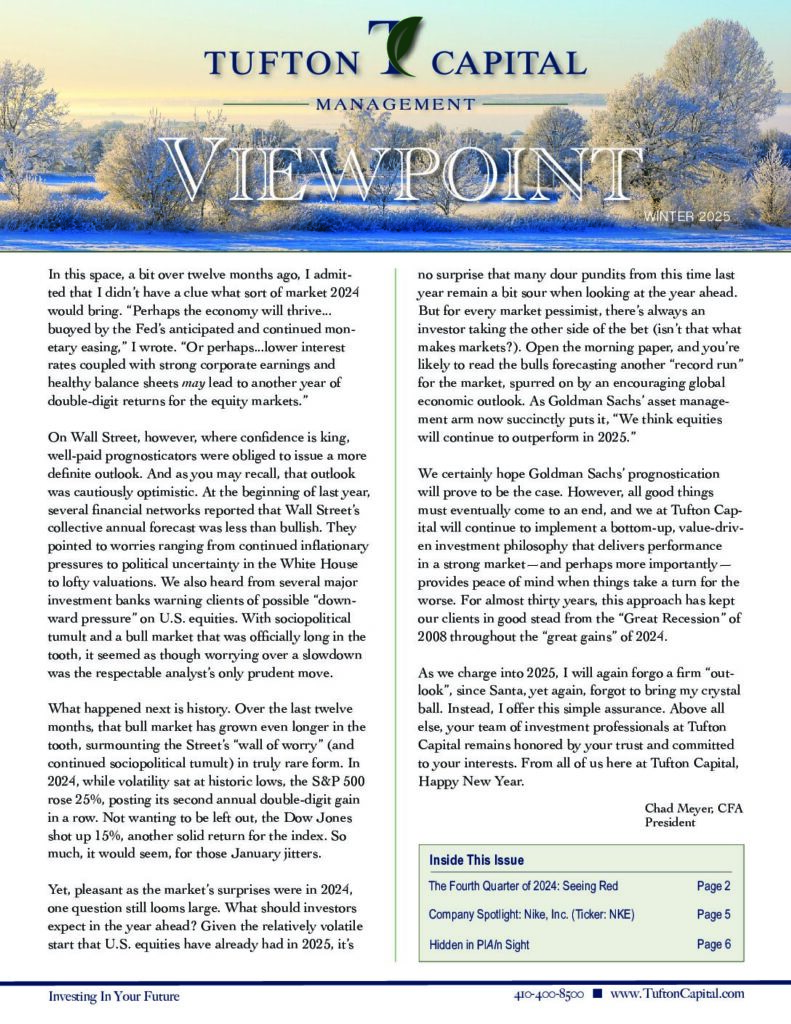2011 Q1 | Thoughts From a Former Investment Banker
 This summer marks my thirtieth anniversary in the financial service industry, beginning at the old Maryland National Bank and ultimately as a senior executive at Ferris, Baker Watts. These two proud institutions, along with countless others, became victims to the ever changing landscape of the industry. Today, “Wall Street” and, in fact, the world’s financial system are dominated by comparatively few investment factories that offer every conceivable alternative investment and access to capital that was unthinkable thirty years ago. Such “progress” has paralleled the dynamic growth of the whole economy and contributed to the advances in our standard of living. Although it would be difficult to argue that we haven’t progressed, does that mean that we have greater clarity about the future? Has innovation and sophistication led to superior investment performance? Are the financial decisions we face any simpler or easier? The answer to these questions is a resounding no.
This summer marks my thirtieth anniversary in the financial service industry, beginning at the old Maryland National Bank and ultimately as a senior executive at Ferris, Baker Watts. These two proud institutions, along with countless others, became victims to the ever changing landscape of the industry. Today, “Wall Street” and, in fact, the world’s financial system are dominated by comparatively few investment factories that offer every conceivable alternative investment and access to capital that was unthinkable thirty years ago. Such “progress” has paralleled the dynamic growth of the whole economy and contributed to the advances in our standard of living. Although it would be difficult to argue that we haven’t progressed, does that mean that we have greater clarity about the future? Has innovation and sophistication led to superior investment performance? Are the financial decisions we face any simpler or easier? The answer to these questions is a resounding no.
Placing client interests first is the critical challenge in our industry.
The brokerage industry from where I came may claim to have its clients’ interests at heart, but its business model rewards its representatives for selling its own merchandise and rates its performance not on client satisfaction, but rather the profit generated from the client. The mutual fund industry has every product imaginable. Indeed, today there are more equity mutual funds than stocks listed on the New York Stock Exchange. Yet few mutual fund managers can consistently beat their chosen investment benchmarks. The academics, attempting to explain away the professional investor’s underperformance, have declared that only a small, random subset of managers can beat the overall market. They say that successful active investment is a result of the luck of the draw, a shot in the dark, or merely an exercise in futility. On top of these burdens many mutual funds charge significant fees which further impair the ability to outperform their benchmarks. Wall Street factories have created a mechanism whereby investors can capitulate, through indexing. Exchange traded funds are index funds that track a stated benchmark. Better to settle for the average than underperform, they reason, though such defeatist thinking fails to deduct the requisite cost and fees of “sophisticated” passive management from gross performance results.
So how is it today that some investors succeed, but most fail? Does one need to be Warren Buffett to be a successful investor? I think I know why most investors fail: they put their trust in institutions whose objectives are not necessarily aligned with their own. This is simply because the interests of the investor and the interests of the advisor often diverge, producing results that satisfy only the advisor. Hardesty Capital Management is a very unique institution. Our investment philosophy is rather simple in that we try to buy assets at the right price and never take more risk than the client should take, or can tolerate. We take real care in developing investment objectives specific to each client, matching their tolerance for risk and developing portfolios customized to their individual circumstances. So, you see, the real reason our clients succeed, is that their interests are always put before our own. What a novel concept and the results speak for themselves. I feel privileged to be part of it.



